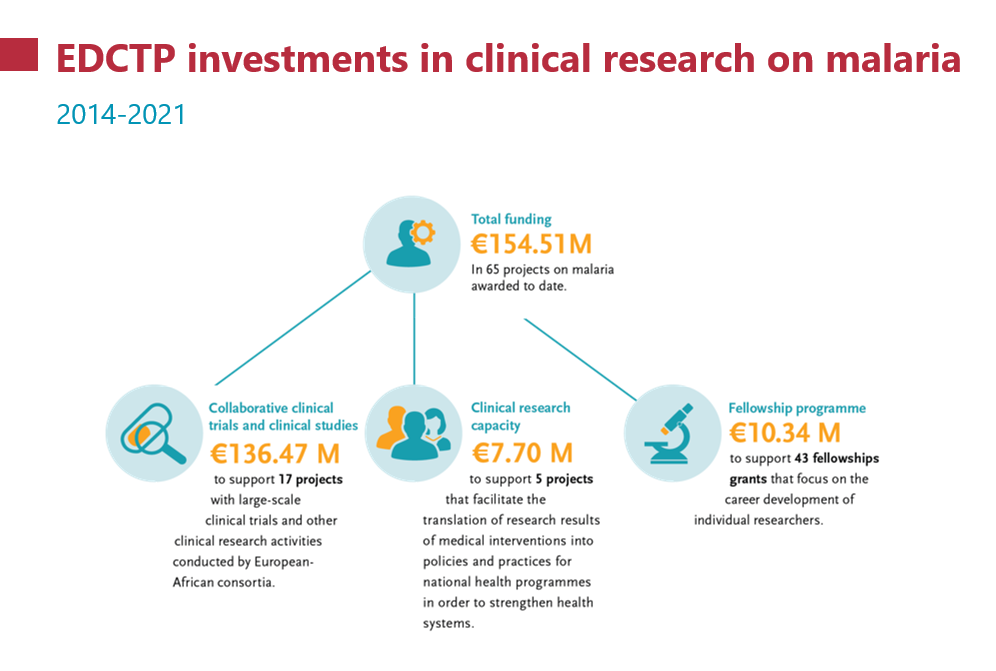Ongoing EDCTP-funded research in RTS,S malaria vaccines
A number of EDCTP-funded RTS,S-related projects are currently ongoing, including:
Strengthening the evidence for policy on the RTS,S/AS01 malaria vaccine: assessment of safety and effectiveness using case-control studies embedded in the Malaria Vaccine Pilot Evaluation (MVPE-CC) – €3,2M
The WHO-coordinated Malaria Vaccine Implementation Programme (MVIP) supports the pilot implementation of the RTS,S vaccine by the immunisation programmes in Ghana, Kenya, and Malawi, where the vaccine is provided sub-nationally in selected areas. Independent of vaccine implementation, evaluation partners measure feasibility of reaching children with the recommended 4-dose schedule, and vaccine impact and safety in routine use. The evaluation component of the MVIP is referred to as the Malaria Vaccine Programme Evaluation (MVPE).
The objectives of the EDCTP2-funded MVPE-CC project are to embed case-control studies into the MVPE, leveraging the MVPE surveillance systems and processes. Case-control studies will address questions that have emerged since the MVIP was designed, and the findings will provide timely, important evidence to inform global policy decisions and will serve to maximise national adoption and uptake.
The overall objectives of the project are to determine:
- The effectiveness of the RTS,S vaccine in preventing severe malaria in vaccinated children and the incremental benefit of the currently recommended 4 doses of the RTS,S vaccine over 3 doses, when implemented through the routine childhood immunisation programme
- The association of the RTS,S vaccine with the safety signals identified in the Phase 3 trial
Additionally, the project will develop and make widely available a toolkit for use by Ministries of Health (MoH) or other stakeholders to support the conduct, analysis, and interpretation of case-control studies after malaria vaccine introduction and engage with these stakeholders to promote wider understanding and use of the methods. The study has recently obtained ethical approvals in each of the three countries (Malawi, Kenya and Ghana) and is expected to start soon.
Building capacity to address implementation challenges for sustainable access and delivery of new vaccines in Ghana (SAVING) – €2,1M
The SAVING project focuses on building Implementation Research (IR) and technical capacities to identify implementation bottlenecks and facilitate the delivery and uptake of new medical interventions using the RTS,S malaria vaccine as an entry point in the Ghana health system.
Ghana had the pilot roll-out of RTS,S in 3 out of 10 regions in the country, and the nationwide scale-up of this is likely going to place a huge strain on the health system. National institutions such as Ghana Food and Drugs Authority (FDA), Ministry of Health (MoH) and the Ghana Health Service (GHS) will be at the forefront of the potential scale-up of the vaccination programme, and are currently co-implementing the SAVING project.
Impact of RTS,S/AS01 vaccine and insecticide-treated bednets on neurobehavioural impairment and school participation in children from rural Kenya (Mal-Brain study) – €149,6K
The Mal-Brain study objectives include:
1) Comparing the prevalence of neurobehavioural impairments between children who previously received RTS,S/AS01 or insecticide-treated bednets (ITBN) and those who received placebo.
2) Comparing the prevalence of school participation between children previously vaccinated with RTS,S/AS01 or using ITBN and those who received placebo.
3) Investigate the role of malaria episodes, chronic parasitaemia burden, admissions to hospital, and immunological correlates of vaccination on neurobehavioural outcomes and school participation of children receiving these interventions.
R21/Matrix-M malaria vaccine candidate: 77% efficacy in Ph2b trial
Positive results from an EDCTP-funded clinical trial in Burkina Faso, published as a preprint with The Lancet, demonstrate that the malaria vaccine candidate R21/Matrix-M is safe, immunogenic and has an efficacy of 77%, exceeding the WHO goal of 75% efficacy for malaria vaccines.
The trial in Burkina Faso was led by the clinical trial investigator, Professor Halidou Tinto of the Institute of Research in Health Sciences (IRSS) in Burkina Faso, as a part of the Multi-Stage Malaria Vaccine Consortium (MMVC). This Europe-Africa malaria vaccine consortium, led by Professor Adrian Hill (University of Oxford) and supported by a €15M grant from EDCTP, aims to develop the first multi-stage vaccine for malaria, designed to target all four life cycle stages of the Plasmodium falciparum parasite. Preparations for a large-scale Phase 3 trial are underway.
EDCTP is supported by the European Union under Horizon 2020, the European Union’s Framework Programme for Research and Innovation. Cofunding from Germany, Sweden and the United Kingdom for these projects is gratefully acknowledged.
Virtual session ‘A new era for malaria control: the role of malaria vaccines’ (18 October 2021)
During the Tenth EDCTP Forum, WHO and EDCTP are organising the virtual plenary session ‘A new era for malaria control: the role of malaria vaccines’. During this session, WHO and partners will share two years of data from the Malaria Vaccine Implementation Programme (MVIP) and explore next steps for the use of the RTS,S vaccine as part of the broader malaria control toolkit.
Date and time: 18 October 2021 | 17:00 – 18:30 CEST
Programme
Register
More information
- EDCTP-funded trial of R21/Matrix-M malaria vaccine shows efficacy of 77% (24 April 2021)
- EDCTP World Malaria Day 2021 message (25 April 2021)

